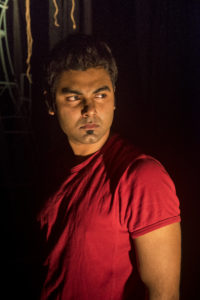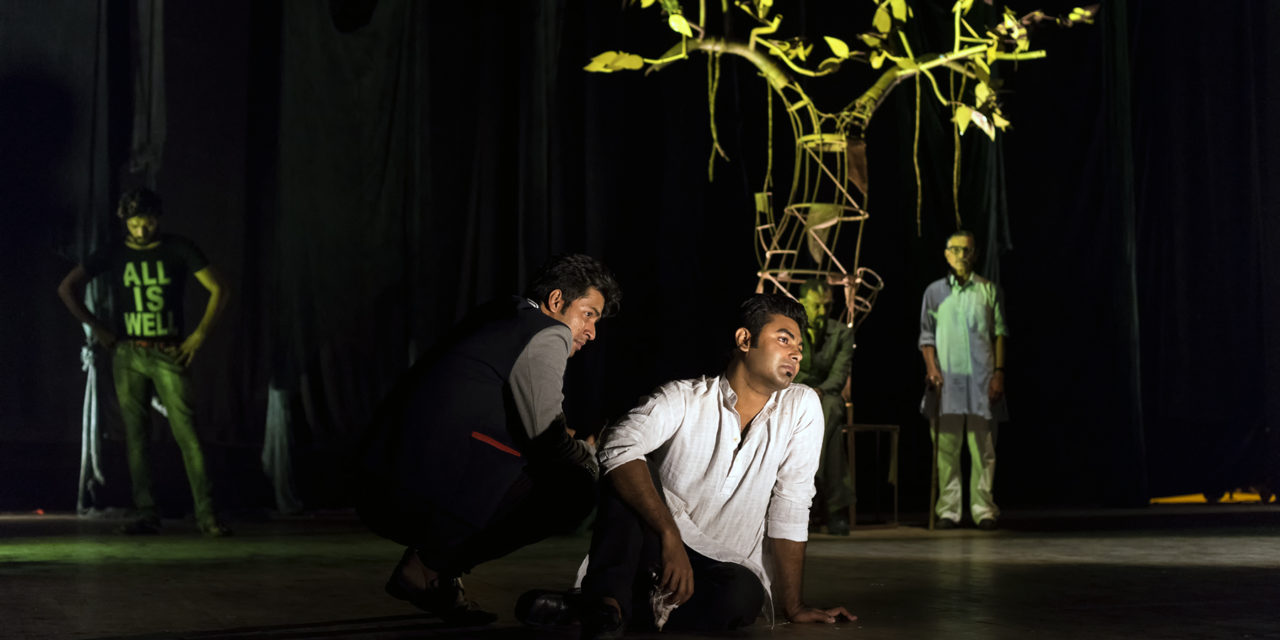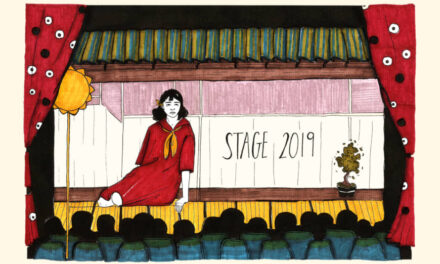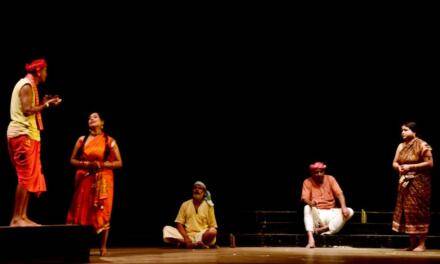Theater performances in India are a costly affair; however, they are in high demand across the country. No doubt, theater in India owes its legacy to Bharata, whose Natyasastra (Dramaturgy) serves as the base on which the entire edifice of theater stands. Various types of rasa provide the raison d’ȇtre for the whole endeavor of translating the play from the page to the stage. The rest is performance and the enjoyment derived from it.
Lately, theater has changed its stance, presentation, and mode of transmitting messages to the broader society, thus appealing to the masses by and large. Theater talks of the ordinary man, his problems, the quotidian existence of women in their households, their sense of neglect and inchoate voices of protest, the inequality of man and woman in society, the dishonor of women in day-to-day scenarios resulting in either rape or dowry-deaths, the deplorable plight of the ‘dalits’ (members of the lower caste), and so on, so forth.
No balderdash is it to say that Indian theater tries to drive a solid message home through its homespun histrionics and theatrical devices. Another trend which is gaining much popularity is the theater festivals, which are being arranged in most metropolitan cities of India, with a few exceptions and additions.
Let me highlight the theatrical jamboree which drew crowds successfully during winter last year; and at the inception of this year, a greater smorgasbord is there to amaze us. Standing at the inception of a new year, when just a couple of months have sped by, it is not so easy to turn a blind eye to the productions that occurred towards the end of 2015, at least.
At the onset of the new year, a plethora of theater productions in Kolkata dazzled our eyes; in Kerala [South India], the theater festival is just over. And, Delhi, too, did not disappoint its enthusiastic audiences, to be frank and fair. The Western part of India is ever buzzing with theater fever, and a glimpse of the same is narrated here by our Regional Editor, Dr. Hemangi Bhagwat, from Mumbai. Sayantan Pal Chowdhury, a young academic from North Bengal, is ready with a piece of heartwarming news from his region.
Shakespeare in Kolkata
In Kolkata (formerly known as Calcutta), winter creates an ideal ambience for theater. As usual, GD Birla Sabhagar observed its Fest with many a production, the most remarkable being Twelfth Night, played by Filter, UK. On the evenings of December 1 and 2, 2015, Kolkata stood spellbound with Shakespearean grandeur, as Filter Theatre Company, UK, in collaboration with the British Council, performed Twelfth Night, as a part of Shakespeare’s 400th birthday observation. Shakespeare lovers of Kolkata made a beeline for GD Birla Sabhagar to listen to a chaste rendition of Shakespeare’s much-loved play. But in lieu of that, they got a different presentation with a brand-new outlook: a freewheeling performance, where the actors indulged in music, gymnastics, ball-on-cap antics, direct interaction with audience during the play, and what not!
It is rather a hallmark of the Filter style that they aim not at line-by-line or word-for-word transcription of a play, but at winning the heart of the audience by roping them in and making them feel part of the performance. This punk style of presenting Twelfth Night on stage reminds us of a rock gig rather than a straight play. Breaking into a mirthful chorus with loud orchestra on singing out ‘Present mirth has present laughter’ or Viola being informed of her present plight on a radio broadcast or Orsino’s rendering of the comic speech ‘If music be the food of love, carry on . . . ’ or the informal request for a ‘boy’s coat’ from the audience for cross-dressing or the orchestra breaking into a crescendo at Sir Toby Belch’s cracking of a drunken joke—all these credit this play with a novelty which, although somewhat off-the-track, could win the applause of younger theatre-goers. However, older among them would love to find the poetry of Shakespeare encased in their dialogues, unaltered, in totality! A lady who teaches at a school in Kolkata came out with a wry remark: “This is a performance of acrobatics and gymnastics and loud orchestra, nothing serious!” This was rather a rock-and-roll remix of Shakespeare’s Twelfth Night, which had an immediate appeal. The acoustics of Filter Theatre are laudable. The music in the play enlivened the audience so much that the comment of Virginia Woolf seems quite cogent in this context: ‘the play seems . . . to tremble perpetually on the brink of music’ (reviewing a revival at the Old Vic in 1933).
In a word, right from chancing upon Illyria to the cross-dressing to the jocular interaction with Sir Toby Belch—all seemed full of life and zest in this colorful rendition of Twelfth Night. To quote Paul Taylor, ‘The Company are developing a cult status . . . But then, experiment is, by its very nature, challenging and to divide audiences is a great deal better than to leave them numbly noncommittal’ (as printed in the theatre brochure).
Kudos to Sean Holmes, the director; Oliver Dimsdale and Ferdy Roberts, the associate directors; Tom Haines, Fred Thomas and Ross Hughes, the managers of acoustics and music; and Alan Pagan, the musician. Ronke Adekoluejo (Olivia), Christie du Bois (Viola/Sebastian), Fergus O’Donnell (Malvolio), Harry Jardine (Orsino / Sir Andrew Aguecheek), Sandy Foster (Feste/Maria), and Dan Poole (Sir Toby Belch) all deserve special applause, surely!

Natadha Theatre Company’s production of ‘Othoi’
Filter Company, UK, performed Twelfth Night in eight cities, including Chandigarh, Bhubaneswar, Hyderabad and Goa, and the four major metropolises Kolkata, Delhi, Mumbai and Chennai (Madras). We must thank the British Council, India, for allowing us to witness such a rare stage-performance in our city! Shakespeare’s plays never lose their appeal and are easily adapted to fit the popular tastes and demands of any era. Since late January 2016, the Kolkata stage is reeling under the fever of another adaptation of this play by Minerva Repertory Theater titled Mumbai Nights, the director of the play being Bratya Basu, a noted young thespian of Bengal. The Shakespeare wave has held Indian audiences captive for aeons, and another instance is the adaptation of Othello into Bengali by Natadha, a noted theater company, as Othoi, being staged in early March in Kolkata. It is a wonderful adaptation, which typifies Othello not as an outsider but as an insider, a victim of the inordinate envy of a childhood companion, who grew up in the same village and had a crush on the same damsel he dreamt of! The question of ‘dalit’ that is making the rounds in India lately serves as the basis for this adaptation. The boys are caught in an upper-and-lower-caste divide, after all! The theater appurtenances, antics on stage and offstage, the overall lively and experimental performance, kept the audience spellbound. The actors were like live wires on stage!
The group theatre of Kolkata has its own appeal and charm. There is a trend among the Kolkata theater companies these days to relive the old classics like Meghnadbadh Kavya (The Tale of Slaying Meghnad) and Katha Amritasaman (Nectar-like Words: The Mahabharata). Kalyani Natya Charcha Kendra, a not so popular group from the outskirts of Kolkata, has been successfully producing Michael Madhusudan Dutta’s celebrated play Meghnadbadh Kavya for a couple of years. Saonli Mitra, the gifted daughter of the legendary thespian Sambhu Mitra, has been solely performing in Katha Amritasaman, re-interpreting an epic, The Mahabharata, in her own way. System, a play staged by Lokokrishrti, a theater group, is out to criticize the ethics of the medical professionals, the greed of the middle-class nouveau riche, the failed attempts to revive the lost idea of ‘camaraderie,’ and so forth.
New Plays and Classics
Phoenix, a theater unit from Malda, West Bengal, recently staged the Bengali version of The Fire and the Rain, a play by Girish Karnad, with perfect élan. The mythical charm of the play, enacted with perfect authenticity, drew applause from the Kolkatan audience. Anuradha Kunda, the director, says, “Girish Karnad’s plays have a charm of their own. But, my improvisation lies in the use of masks, corresponding to the demand of the scene.” Lately, in a program conducted by the group Shoi—headed by Nabaneeta Dev Sen, the first wife of Nobel laureate Amartya Sen—Anuradha Kunda staged Do Haath (Two Hands), awakening in us the all-inclusive responsibility of the ‘mother’ of a household who cannot disown her daughter-in-law, whose husband is away at the warfront, even after she gets pregnant by someone else. The mother-in-law cocks a snook at the neighbors’ repeated demand to chuck her daughter-in-law out for this offence. The two hands with which she manages all the chores of the household stop the old lady from taking such a drastic step. Originally written by Ismat Chughtai, a noted Urdu writer, and transcribed into Bengali by Anuradha, the play tickles the audience to laughter while raising a voice of protest against injustice towards women.
In Delhi, recent productions evoked mixed responses from audiences. Tajmahal ka Tender (The Building Contract for Tajmahal) drew flak. Though the initiative was honest, the audience could not take it so vibrantly. It’s a story narrating how Samrat Shahjahan (Emperor Shahjahan) would have seen all his efforts go to waste if he were to try to build a monument (Taj Mahal) in memory of his beloved wife in these times. His riches would have been emptied even before he could see the foundation of this monument being laid, while the bank balances of contractors and realtors involved in this project would soar high! The play Tumhari Amrita (Your Amrita), on the other hand, should be mentioned for its candid projection of ‘love’ through an exchange of letters between two persons: Farook and Shabana. Feroz Khan, the director, has moved far from the conventions of drama and tried to drive home an important message about relationships between a man and a woman.
In Kerala (Southern India), in mid-January (10–16 Jan 2016), the International Theater Festival stirred the appetites of theater-goers for good performances. Unlike in previous years, this time the theme was “Body Political.” According to Sankar Venkataswaran, the art director of ITFoK (International Theater Fest of Kerala), ‘body is often used as a metaphor to describe the function of a state, an organization or a group of people working together’ (qtd. in Frontline, March 4, 2016). This year, the main attraction was the plays from Lebanon, especially performed by the unit Zoukak, namely, “Heavens,” “Silk-Thread,” “Battle-Scene,” and so forth. It is quite interesting to find a note of optimism latent in Zoukak’s performances, especially when the globe is threatened each day by the destructive terror tactics of ISIS and other killer factions. Liberal philosophy wins over terrorism.
This post was written by the author in their personal capacity.The opinions expressed in this article are the author’s own and do not reflect the view of The Theatre Times, their staff or collaborators.
This post was written by Ketaki Datta.
The views expressed here belong to the author and do not necessarily reflect our views and opinions.

















